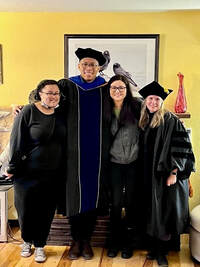
What is a PhD for?
When looking for resources to add to this website, I came across Dr. William Beeman's guidance on how to think about a PhD. I couldn't say it better in my own words, so I'll quote them here:
"Ph.D. training is professional training for people who wish to have careers as researchers. The Ph.D. is not a 'trophy' for being smart, nor is it [simply] a way to 'get a job.' Thus the Ph.D. is awarded for people who have gone through professional training and have shown that they are ready to create new knowledge through research at a standard that will be recognized as fully professional by the best practitioners in research in your field. Simply having an interest in a given field is not sufficient to qualify for admission. You have to show in your application –most clearly in your personal statement – that you are quite clear about your career goals in pursuing research in your given field as a profession. You first need to do your homework and choose the program or department [OR LAB] that is the best fit for your reseach interests and your projected career trajectory. A good test is to look for the authors of research that you have read and admire…”
The one thing I will add to this statement is that graduates from my lab are also expected to become "practitioner researchers" - they must be competent in the design and lead of research at a professional level, and also incorporate collaborative approaches that facilitate the uptake of that research in environmental management strategies and policy.
M.S. GRA/GTA position available to start January 2025. Applications due August 2024. See more information here.
Students in my lab tend to be funded through a combination of Graduate Teaching Assistantships and external grant funding.
Graduate Teaching Assistantships (M.S. or Ph.D.)
I welcome students for Graduate Teaching Assistantships with interests in applied research on conservation psychology, human wellbeing, cultural ecosystem services, risk/vulnerability/displacement, or related topics. The availability of these varies by year. You should send me an email to check if they are available within your timeframe. In the case that they are, follow these guidelines:
To apply:
First, confirm if I have space in my lab by looking at this website and/or sending me an email. If there is availability, prior to applying to the OSU graduate school, please send me a CV and 2-page research proposal describing (in general) the research you would like to conduct, including hypotheses/questions, methods, justification, intended products, and your thoughts for obtaining research funding (if in addition to or in place of GTA support). First Nations and Latin@ students are encouraged to apply
Expectations:
A few helpful resources for considering your graduate career:
When looking for resources to add to this website, I came across Dr. William Beeman's guidance on how to think about a PhD. I couldn't say it better in my own words, so I'll quote them here:
"Ph.D. training is professional training for people who wish to have careers as researchers. The Ph.D. is not a 'trophy' for being smart, nor is it [simply] a way to 'get a job.' Thus the Ph.D. is awarded for people who have gone through professional training and have shown that they are ready to create new knowledge through research at a standard that will be recognized as fully professional by the best practitioners in research in your field. Simply having an interest in a given field is not sufficient to qualify for admission. You have to show in your application –most clearly in your personal statement – that you are quite clear about your career goals in pursuing research in your given field as a profession. You first need to do your homework and choose the program or department [OR LAB] that is the best fit for your reseach interests and your projected career trajectory. A good test is to look for the authors of research that you have read and admire…”
The one thing I will add to this statement is that graduates from my lab are also expected to become "practitioner researchers" - they must be competent in the design and lead of research at a professional level, and also incorporate collaborative approaches that facilitate the uptake of that research in environmental management strategies and policy.
M.S. GRA/GTA position available to start January 2025. Applications due August 2024. See more information here.
Students in my lab tend to be funded through a combination of Graduate Teaching Assistantships and external grant funding.
Graduate Teaching Assistantships (M.S. or Ph.D.)
I welcome students for Graduate Teaching Assistantships with interests in applied research on conservation psychology, human wellbeing, cultural ecosystem services, risk/vulnerability/displacement, or related topics. The availability of these varies by year. You should send me an email to check if they are available within your timeframe. In the case that they are, follow these guidelines:
To apply:
First, confirm if I have space in my lab by looking at this website and/or sending me an email. If there is availability, prior to applying to the OSU graduate school, please send me a CV and 2-page research proposal describing (in general) the research you would like to conduct, including hypotheses/questions, methods, justification, intended products, and your thoughts for obtaining research funding (if in addition to or in place of GTA support). First Nations and Latin@ students are encouraged to apply
Expectations:
- Teach one E-Campus course per quarter
- Design and conduct original, empirical research on the human dimensions of fisheries and wildlife conservation
- Co-author ~1 manuscript every other year with Dr. Biedenweg, Dr. Jones or Dr. Chisholm-Hatfield
- Submit proposals to obtain research funding
- Follow departmental guidelines to meet graduation requirements in about 2 years (M.S) or 4-5 years (Ph.D.)
A few helpful resources for considering your graduate career: